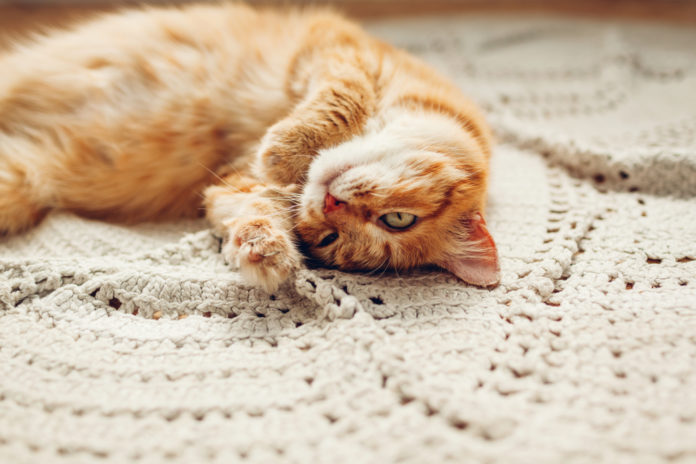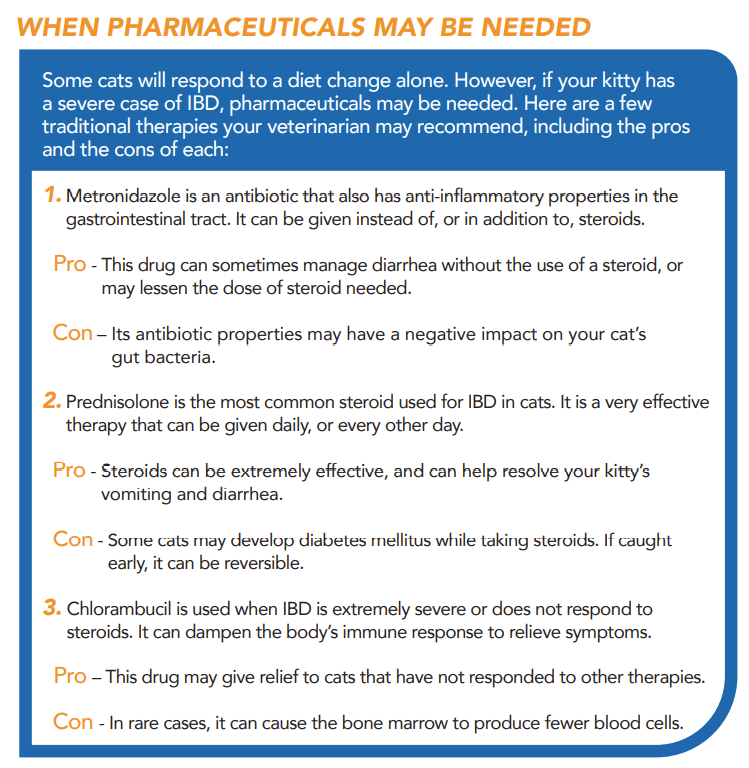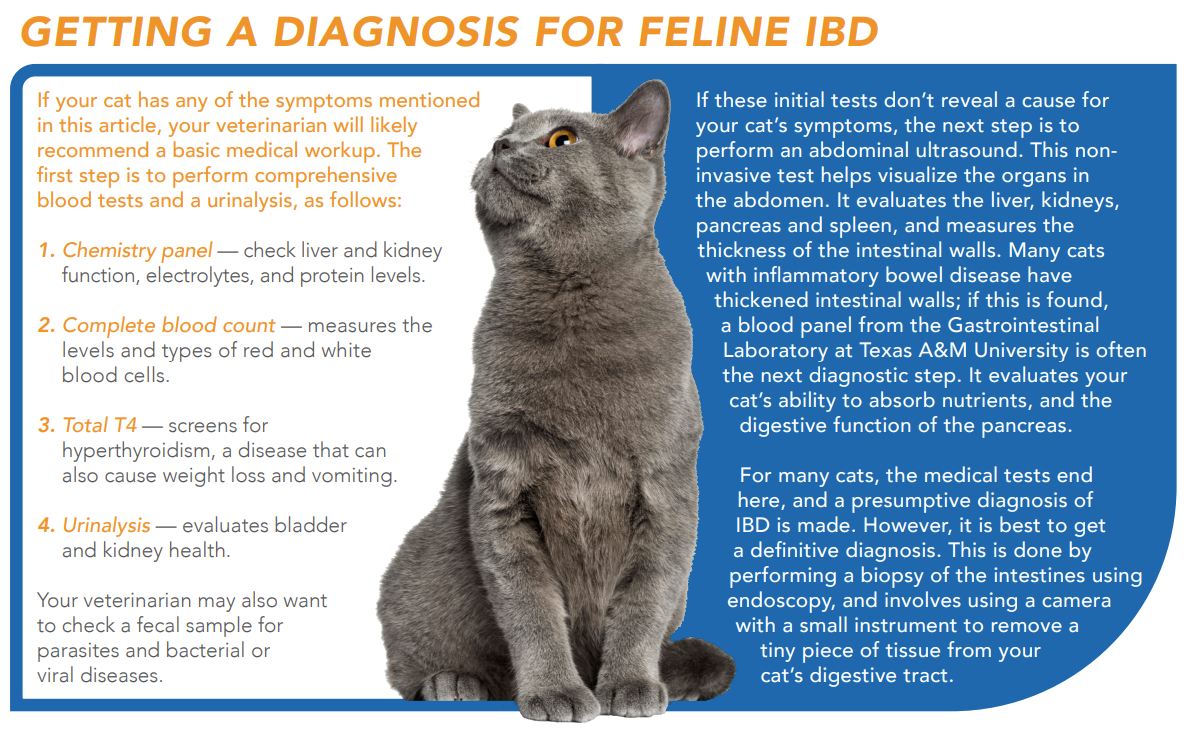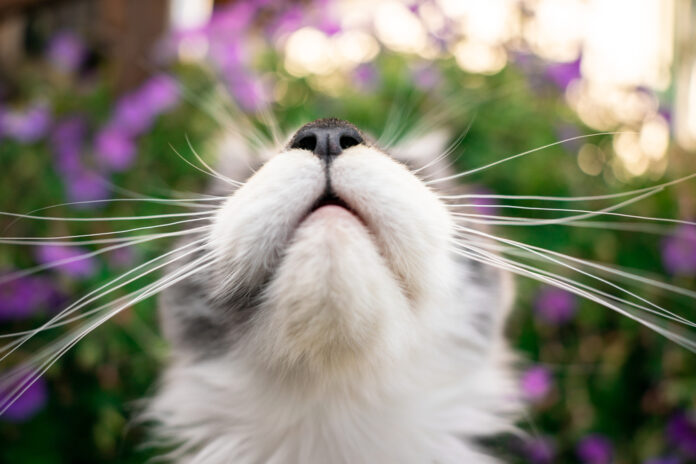IBD in cats – an integrative approach to treatment

From diet therapy and natural remedies to pharmaceuticals when needed, an integrative approach is the best way to successfully treat IBD in cats.
Vomiting is a common problem in cats, and one that has previously been labeled as “normal” by many veterinarians. The truth is, regular vomiting is not normal; in fact, it’s often a sign of a treatable condition called inflammatory bowel disease (IBD). A range of treatment options can be used for cats with IBD, including diet, herbal remedies, and natural therapies such as probiotics, acupuncture and even CBD. An integrative approach that includes these modalities, along with pharmaceuticals if the IBD is severe, can effectively treat the disease
Other signs of IBD
It’s important to know that vomiting is not the only symptom of inflammatory bowel disease in cats. Other common signs include diarrhea, nausea, low appetite, and weight loss. One or all of these symptoms may be present with IBD. For example, some kitties may only suffer from gradual weight loss while others may present with diarrhea only. Start by getting a proper diagnosis from your veterinarian (see sidebar below).
 Try diet therapy first
Try diet therapy first
If your kitty has symptoms of IBD, diet therapy can be initiated before, during, or after any diagnostic tests. I recommend keeping a diary of any diet changes, along with daily reports of vomiting and stool consistency, if possible. Here are my further recommendations:
- Switch away from kibble. If your cat is eating commercial dry kibble, try switching to canned or raw food. In my patients with occasional vomiting, I see great success with this step alone. If your cat usually has kibble available, consider feeding her three or four meals per day when switching to a canned or raw diet, to keep her satiated.
- Feed a novel protein. I prefer this step if a patient’s symptoms are more severe, or if significant weight loss has occurred over time. Novel proteins are simply meat sources your cat has never eaten before. These may include alligator, duck, venison, lamb, and kangaroo. I recommend feeding only one protein source at a time to have a clear understanding of how your kitty responds to each one.
- Consider hydrolyzed diets. These diets have the proteins broken down into smaller pieces. Ideally, this means your cat’s body cannot identify (and therefore cannot negatively react) to the protein the way it might normally do. Hydrolyzed diets are very digestible, but often not as tasty as other formulas.
Natural therapies
Non-pharmaceutical therapies can be tried first, or given in addition to conventional medications (see sidebar above). Consider the following when creating a treatment plan with your integrative or holistic veterinarian:
Vitamin B12
Your cat’s blood levels of vitamin B12 may be low due to her intestinal disease. This vitamin is easy to replace with regular subcutaneous B12 injections (weekly/monthly) that you can give at home. They can also give your kitty more energy.
 Probiotics
Probiotics
The bacteria in the intestines of cats with IBD differ from those in cats with healthy guts. Probiotics can help manage and promote good gut flora (bacteria) in your cat, and can be easily sprinkled on her food twice daily. I prefer to alternate between soil-based probiotics and non-soil-based probiotics. I also like to alternate between single strain formulas and multi strain formulas, to provide a variety of probiotic strains.
CBD
Hemp-derived CBD can help decrease inflammation and lessen IBD symptoms. I recommend 2 mg to 4 mg twice daily for an average 10 lb cat. CBD can be given on food, and most cats tolerate the oil with no side effects.
Fecal transplants
This therapy is now being performed by some veterinary internal medicine specialists. The concept is similar to probiotic use, and can help populate the intestines with healthy gut bacteria and thereby reduce inflammation and symptoms.
Herbal therapies
Both Western and traditional Chinese herbal formulas can help decrease inflammation of the intestines and reduce vomiting and diarrhea. Formulas like Si Miao San, San Ren Tang and Chu Shi Wei Ling Tang can help reduce symptoms in cats with IBD.
Acupuncture
Acupuncture can help decrease nausea and increase appetite. It can help keep your kitty feeling better while maintaining a healthy weight.
The treatment plan for inflammatory bowel disease will be unique to your cat’s needs, as well as ever-changing. When it comes to IBD, It’s very important to work with your veterinarian, listen to your kitty, and stay flexible. With vigilance and the right treatment regimen, she should start feeling better soon.



